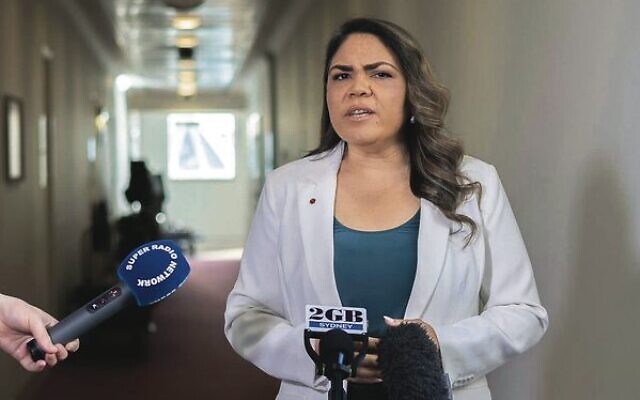Leave Jewish values out of the decision
Jewish law, custom, tradition and experience suggest that support for a First Nations Voice to Parliament open to question.

A number of Australian Jewish communal bodies as well as some influential members of the Jewish community have not only stated support for the establishment of a First Nations Voice to Parliament in the Constitution but have represented publicly that doing so is consonant with Jewish values.
Jewish law, custom, tradition and experience suggest that this is open to question.
Legislating division is unwise
Jews have learned from bitter experience that the political creation of ethnic or racial divisions in a society is not a good thing. This view is shared by Senator Jacinta Nampijinpa Price, who has stated, “It is not right to divide us along the lines of race, especially within our Australian founding document.”
Man is created in God’s image
Scripture teaches us the sanctity of human life and that all men are equal in God’s eyes. Over 90 per cent of Australians voted Yes in the 1967 referendum because they understood that Indigenous Australians, just like all other ethnic and racial groups, should take their rightful place as equal members of our society.
But the Voice would be a permanent body advocating for only one racial group. This is antithetical to Jewish teaching.
William Cooper
Jewish proponents of the Voice often justify their support by referring to the march led by Indigenous leader William Cooper to the German consulate in Melbourne in 1938 to protest Kristallnacht and the treatment of Jews in Germany.
Cooper’s activism was praiseworthy, but the dire circumstances faced by Jews in confronting antisemitism in Nazi Germany is hardly comparable to the conditions faced by Indigenous Australians today. The analogy is inappropriate.
The Voice is not a proved moral imperative
A fundamental Jewish obligation, expressed several times in our scriptures, is to imitate a just and moral God. That means we must satisfy ourselves that any initiative we are asked to consider is moral and just.
The Voice is an initiative sought by the Uluru Statement from the Heart of 2017. Surprisingly, that document does not contain a single persuasive argument that the initiative is moral or just. Instead, it contains a number of aspirational (and indeed tragic) statements which are often passed off as arguments by proponents of the Voice.
Aspirational statements or objectives devoid of detail or evidence that they are likely to succeed, whether appearing in the Uluru Statement from the Heart or made by our political or communal leadership, should never be accepted as arguments nor should mere assertions be taken as fact.
Tikkun olam
Jews have always been in the vanguard of promoting “social justice” initiatives under the obligation of tikkun olam (repairing the world). However, the complete expression appearing in our liturgy is “to repair the world under the kingship of God” which means, according to our sages, by following His commandments.
This is very different from attempting to realise aspirational but unsupported statements or objectives such as those contained in the Uluru Statement from the Heart. The Voice has nothing whatever to do with implementing God’s will.
Justice v compassion
The Torah, no less than four times, warns us not to confuse justice and compassion and not to misplace our compassion. Perhaps this is because a subjective discretion must be exercised as to who should be favoured with limited available resources. While there is an over-arching biblical injunction to pursue justice, there is no corresponding over-arching commandment to be compassionate. Instead, the Torah gives example after example of how compassion should be exercised in a deserving case.
We don’t need to establish a new bureaucracy with all its inevitable cost, waste and inefficiency, not to mention the fracturing of social cohesion which the Voice is likely to cause. When help for the disadvantaged is needed, charity and assistance can be given or other programs promoted, without a permanent legislative focus on the race or ethnicity of the recipient, whether an individual or a community.
The ugliness of proving eligibility
The currently un-askable question “Who is an Aboriginal Australian or a Torres Strait Islander?” will inevitably arise, especially if the Uluru Statement from the Heart eventually leads to a treaty, truth-telling, reparations and compensation. The government, to avoid rorting, will have to specify the criteria for determining Aboriginality. How is that to be done? Will it be based on genetic markers or the number of grandparents who were Aboriginal? I despair that this sort of ugliness, reminiscent of race laws which targeted our parents’ and grandparents’ generations, could soon surface in modern Australia. This is one of many collateral issues that have simply not been properly thought through.
It is every voter’s prerogative to formulate an opinion on the Voice after, one would hope, a serious consideration of both the Yes and No cases. But either way, members of the Jewish community should not believe it is religiously virtuous to vote Yes or fear that it would contravene Jewish values to vote No.
Geoff Bloch is a commercial barrister and a baalei kriyah (Torah reader) at Mizrachi shule in Melbourne.

comments